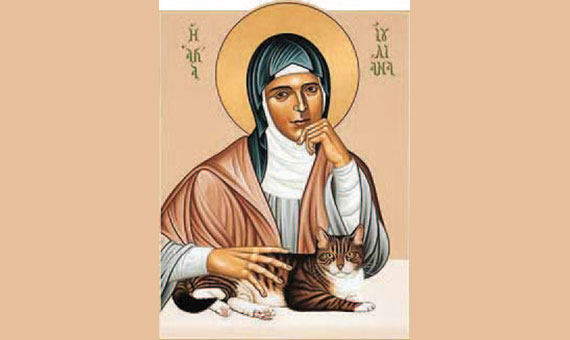Azadi ka Amrit Mahotsav Kolkata event honours four Clergymen
Pope Francis asks businesses to support working women: They’re ‘afraid to get pregnant’
Study: Christianity may lose majority, plurality status in U.S. by 2070
Indian politician declines Magsaysay Award under party pressure
Like John Paul II, Pope Francis heads to Kazakhstan during time of war

Revelations of Divine Love
Julian of Norwich was an anchoress who lived in solitude in Norwich, England, in the late fourteenth century. She is called “Julian” because her cell was attached to the parish church of Saint Julian at Norwich. We do not know her given name. According to her own account, in May, 1373, she received her revelations when she was thirty and a half years old and these are recorded in the “Revelations of Divine Love” one of the important piece of literature in Christian mysticism. There are two versions of it, the short version, which has twenty-six chapters in which she simply recorded the revelations and the long version, with eighty-six chapters, in which she reflected upon the revelations and expounds an original and competent theological vision of life. She freed herself from conventional contemplative notions and came to see that the content of the revelations was identical with that of the faith, and must therefore contain doctrine applicable to all Christians. The kernel of her message is God’s love, but she does not shrink from the speculative problems posed by sin and evil.
Julian tells us that she desired three graces from God: to have a recollection of Christ’s Passion, to have a bodily sickness when she was thirty, and to have, of God’s gift, three wounds – contrition, compassion and longing with her will for God. She says that all these were granted to her. Together with them she also had a spiritual vision of God’s love. She saw that God “is to us everything which is good and comforting for our help.” God revealed to her that He loves His creation and He is the creator and protector of all that exists. Creation “lasts and always will, because God loves it.” She had visions of Christ’s temptations, His Passion, and of the Virgin Mary. Other visions were related to sin, prayer, the Trinity, God’s sovereignty and so on. In Julian’s visions we have one of the clearest expositions in spiritual literature of the fact that God is our Mother as well as our Father. Julian notes that “God rejoices that He is our Father, and God rejoices that He is our Mother, and God rejoices that He is our true spouse, and that our soul is His beloved wife.” She speaks also of Christ as “our Mother, brother and saviour,” an image common in the earlier Middle Ages. Julian talks of how we were born out of the travails of Christ’s Passion. She goes on to say that as “the mother can give her child to suck of her milk,” so “our precious Mother Jesus can feed us with Himself, and does most courteously and most tenderly, with the Blessed Sacrament.”
Vitally aware of God’s love, Julian was also aware of sin, which she described as “the greatest pain that the soul can have.” Sin is necessary but has no substance. We recognize it in the pain it causes us. “Despite God’s constant nurture, we fall into sin because of our inconstancy and by the prompting of our enemy, the Devil.” “We cannot in this life keep ourselves completely from sin, in the perfect purity that we shall have in heaven. But we can well by grace keep ourselves from the sins which would lead us to endless torment.” In chapter eighty-six of the long text, Julian summarizes what she had learned in reflecting on her visions. “What do you wish to know your Lord’s meaning in this thing? Know it well, love was His meaning. Who reveals it to you? Love. What did He reveal to you? Love. Why does He reveal it to you? For Love.” In one place she notes that she learned that we have two kinds of sickness of which God wishes to cure us: impatience and despair. The cure is to realize that not only is God “almighty and may do everything, and that He is all wisdom and can do everything,” but also to know that God “is all love and wishes to do everything.” Julian’s ultimate faith is found in a recurring and well known phrase: “All shall be well, all shall be well, and all manner of thing shall be well.”
Isaac Padinjarekuttu
(Professor of Church History
at Oriens Theological College, Shillong)
Leave a Comment